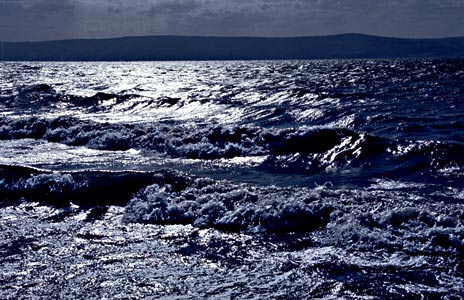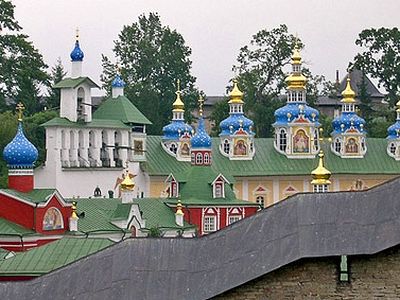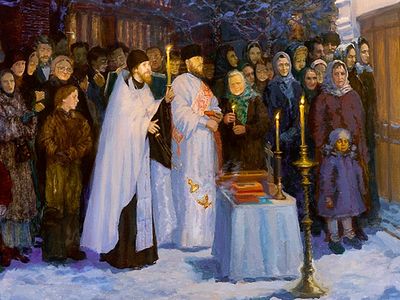 The Lake of Gennesaret
The Lake of Gennesaret
A train to Tbilisi awaited us in the evening, and a letter from Vladyka Pitirim lay in the Publishing Department, requesting help from Patriarch Ilya for the shooting of the film, “The Eucharist.”
I called all my friends who had participated in Fr. Augustine’s fate, and asked them to gather at Volodya Vigilansky’s that evening in order to talk over everything for the last time before our departure.
I already knew what I would do. When we would all get together with Augustine and sit at the table, I would inform them that I had just arrived from Omsk. I would carefully watch Augustine’s reaction. Then I would invite them all to hear a story about how a young man had appeared in Omsk roughly ten months ago, how he came to the church, and said he was an orphan. I would tell them how they all pitied him, gave him shelter and work, how he gained the trust of the rector and warden, and how he later pitilessly robbed the church, stole the church vessels, along with money collected by the parishioners, and even a cross—from no other place than from the holy altar table! Everyone will gasp and express their disapproval of such a blasphemous deed. I will go on.
“Let me tell you another story,” I will say. “One man arrived at St. Sergius Lavra and acted like a hierodeacon without ever having been ordained. More than that—he dared to serve the Liturgy!”
Here, of course, everyone will be just shocked! I will continue, still watching Augustine.
“And here is another story. One man came to the mountains, to the same place where you were laboring in asceticism, Fr. Augustine. After learning many details about the monks’ way of life, he began to present himself as a monk from the mountains in order to cover the tracks of his former life, and try to obtain documents in some one else’s name. And, can you imagine—the hero of all these stories is one and the same man!”
Someone will surely exclaim here (most likely Olesya or Elena), “So who is it?”
And I will turn towards Augustine, and say, “Fr. Augustine, what do you think—who is it?”
At this he cannot but give himself away!
“Who…?” Augustine will say, barely moving his lips.
Then I will reply like investigator Porphiry Petrovich in Crime and Punishment, by my beloved Dostoevsky, “Who? Why, it is you, Fr. Augustine! It could be no one else …”
Here everything should become clear from his reaction. No normal person would be able to hide his feelings.
There was only a half and hour left before the friends I had invited would arrive. When I entered Volodya’s apartment, I immediately invited Fr. Augustine to take a taxi with me to the Publishing Department to get the letter for Patriarch llya. He gladly agreed to go for a ride in a car, and also see the publishing house.
Then a thought came to me, that after being exposed, he could run away and again commit some crime in the Church. Therefore, I suggested:
“Fr. Augustine, let’s take a picture together! We can leave Olesya and Volodya a picture to remember you by.”
He thought about it, and agreed reluctantly. I then committed an indiscretion and blurted out, “Yes, and if the police arrest us they won’t have to waste any film—we’ll snap them in profile and full face.”
I regretted this as soon as I said it. Augustine looked at me so evilly that it my blood went cold. I tried very hard to turn my stupid and vain words into a joke. Fortunately, it worked. Augustine let us photograph ourselves with him, although from time to time he glanced at me mistrustfully. He had clearly begun to worry.
Finding a minute while he gathered his belongings, I took Volodya into the kitchen, and closing the door behind me, said to him in a whisper, “Augustine is in all probability not the man he says he is! It is very possible that he is a serious criminal! I am not joking. I will leave with him, and you search his things without delay, in case there is a weapon or something.”
Volodya looked at me with his eyes wide open, and for a minute couldn’t pronounce a word. Then he opened his mouth:
“Do you know what you are saying? Are you crazy? How could you even imagine that I would search through someone else’s belongings?”
“Listen,” I said. “Forget about your intelligentsia mannerisms. This is too serious! We could be talking about the lives of your children!”
Finally, Volodya began to understand. Without saying another word, I took Fr. Augustine and left with him for the Publishing Department.
We talked about something along the way, ate some ice cream—I wanted to give Volodya more time. When I returned, the owner of the apartment appeared before us as white as chalk. I took him quickly into the kitchen, and shouted to Augustine to greet the guests.
In the kitchen, Volodya barely managed to whisper:
“There are documents in the name of one Sergei (Volodya said his surname), an altar table cross, money—two and a half thousand rubles—a medal of St. Vladimir… What is going on?”
“Are there any weapons?”
“No weapons.”
A ring came from the hallway. Igumen Dimitry from the St. Sergius Lavra had arrived. We heard Augustine greet him, and how they went into the living room.
But even with these new findings, I still could not believe conclusively that it was all real. This was shocking! I shared some of my feelings with Volodya. Even after seeing with his own eyes the passport and a large sum of money, he was incapable of believing that Augustine was not the man he claimed to be.
Zurab and Elena Chavchavadze arrived.
When Volodya and I entered the living room, everyone was gathered. We sent the children out to play.
“Well, why have you called us together?” Igumen Dimitry said with displeasure. He had to come all the way from Sergeev Posad.
I looked at Fr. Augustine, and understood directly that he had guessed what was going on, and that it was all true! I also understood that if I begin my story with investigator Porphiry Petrovich, the situation would unfold just as I had conceived it, even up to the final, “Why, it is you, Fr. Augustine! It could be no one else …” with all the proceeding reactions of Augustine and everyone else present. Suddenly, I became truly sorry for him. Although, I have to admit that I had yet another feeling—triumph. The triumph of a hunter who sees that in just one second the prize will be in his hands! But such a feeling was obviously not Christian.
Therefore, I threw out the whole plan I had so carefully rehearsed, and turned to him with one word:
“Serezha!”
Everyone could see how he turned deathly pale.
What happened then?! Everyone was on their feet, shouting, “What Serezha? What is going on here?! Both of you, explain yourselves to us right now!!!
Only he and I were sitting, looking silently at each other. When everyone had at last calmed down and taken their seats, I said to him:
“This morning I returned from Omsk. There I received all these facts about your life history. The right thing for me to do would be to dial 02, and the police will be here in five minutes. But nevertheless, we are giving you a last chance. You saw how we sincerely wanted to help you. If you tell us the whole truth right now, from beginning to end, perhaps we will decide to help you again. But if you say a single lying word, I will immediately pick up the phone and call the police. And there is no need to explain to you what reward you will get for your “feats.” Now everything depends upon you.”
Sergei was silent for a long time. My friends were also silent, and gazed with astonishment at him, their beloved “mountain monk,” their “angel-jungle boy”… while my heart stood still as I waited in the total silence for his decision.
Then he said, “Alright, I’ll tell you everything. But on one condition: that you guarantee that you will not turn me in to the police.”
“There is only one guarantee, Sergei, only one now—your absolute honestly. As soon as I see that you are lying, the police will come.”
Again, he sunk a long time in thought. It could be seen that he was feverishly calculating whether or not he could twist his way out of the situation, or get some advantage. The sight of this was so unpleasant that any remaining pity for him evaporated.
“Where should I begin?” he finally asked, looking quizzically at me.
There was an obvious catch to this question. He wanted to feel out what I really knew about him.
“You can start wherever you want. With Omsk, Sukhumi, or with your time in the Lavra. But it would be best if you start from the very beginning!”
Judging from the way he hung his head in disappointment, I understood with relief that I had hit the mark, albeit with my last ammunition. I didn’t have anything else in reserve.
Then Sergei began to talk.
He was a criminal, a con artist, a thief. He had thieved from the time he was a child, and at age eighteen he was hiding from an inevitable prison term, having come of age for military duty. But there, in the army, he was immediately spotted by a quick-witted officer in charge of the unit’s warehouse, and together they began eagerly selling off the army’s possessions. One of their clients was, by the way, a neighboring priest, who was restoring a ruined church. In those days it was impossible to buy building materials for a church without special sanction from the local plenipotentiary of the Council on Religious Affairs; so, as was par for the course during those soviet times, the priest bought bricks, cement, and boards from Sergei. Sergei would sometimes go to the priest’s house, and was touched in a real way by his sincere kindness and solicitude, his fatherly care for the “soldier boy.” It also surprised him that batiushka did not labor for himself—he was poor; but for the church, and for his faith.
Then suddenly the unit was going to be audited. Sergei quickly realized that his officer friend would turn him in without holding anything back in order to save his own skin. Without thinking long about it, he grabbed the proceeds, got on the first train that rolled in, and took off as far as possible. The train took him to Omsk. He had nowhere to go, when he suddenly remembered the kind priest. Sergei looked for a church, and calling himself an orphan, found there a well-fed and reliable haven for many long months. The babushkas could not praise him enough. Sergei himself entered little-by-little into the church’s everyday life, learned new words and expressions, and was amazed at such kind and trusting relationships between people as he had never seen before in his life.
But by spring, Sergei wearied of the elderly congregation in the church at Omsk, and began to dream of freedom. Just at that time, the elderly warden, who called him “grandson,” as a sign of complete trust, sent him to make the annual payment… He stole the money, although he knew that it had been collected with great difficulty, a kopeck at a time, for the despicable soviet Peace Fund; he took everything else that he liked from the church, and set out for freedom.
He spent the next few days enjoying himself immensely, and nearly ended up at the tank, then in fear he fled once again to the faithful—to those eccentrics, those trusting and strange people, who you could wrap around your finger with no difficulty at all.
He arrived at the ancient, beautiful Holy Trinity-St. Sergius Lavra, called himself Hieromonk Vladimir, and even he was surprised at how rapidly he found himself in full monastic regalia, surrounded by pleasant, though somewhat wearying, friendly concern. His hopes of obtaining a new passport here were not justified. Moreover, it became ever more dangerous to remain in the town of Zagorsk, as it was called then, which was under constant and thorough surveillance by the police and the KGB.
“Why did you dare to serve the Liturgy?” I asked. I really wanted to know. Besides, it was useful to show him that I knew such details.
“Well, what else could I do?” Sergei muttered sadly. “The monks kept insisting. ‘You are a hierodeacon,’ they would say, 'so why don’t you serve?’ Well, I…”
“How horrible!” exclaimed Olesya.
Sergei heaved a sigh and continued his story.
When he heard that there was a place in our country where people live without any documents, where it is warm and free, he went to Sukhumi. After a month and a half of living in the Caucasus, he visited not a few mountain cells and sketes. Because he called himself Hierodeacon Vladimir and brought greetings and notes from the monks of the Lavra, they took him to places where few are allowed, and told him things that few have heard. Sergei had no thought of remaining in the mountains. However, he heard there that the Superior of the Pskov-Caves Monastery had helped one of the monks who had come down from the mountains due to illness, and gotten documents for him. He also heard about the tragedy of Monk Augustine…
The rest we already knew.
When Sergei finished his story, I sent him to his “cell.” We remained in the living room. Again the same question arose before us that had tormented us for the last two weeks: what should we do with him? Only this time it was proceeding from entirely different circumstances.
When at the beginning of our discussion I told Sergei that I could call the police at any moment, I was not telling the truth. We could in no way turn him into the police! Not only because Sergei could later tell the investigator that we had very seriously considered buying a false passport. That was nothing. More odious was that this man had been in the mountains and learned all the major paths from a legal position in the Church to an illegal one. He knew Matushka Olga and Deacon Gregory from Sukhumi, and knew about their connections with nearly all of the secret hermitages. He had lived in the mountain refuges, learned the paths to elders who were living in the mountains for many decades. The law enforcement officials would promise him much to acquire such information. But neither could we simply let him go, out of sight and out of mind; he would most likely head for another church or monastery to make his living.
The next day we left for the Lavra to talk this over with the most authoritative spiritual fathers. The fathers were horrified by our story, and were astounded at the ways of God’s Providence, but in the final analysis did not offer any practical solution to our problem.
The situation was running into dead-end. Our hero could now sense our indecision and gradually took charge, felt more assertive, and again began sending the children for ice cream, especially since to them and around them he was still “Fr. Augustine.”
So, after some time it became clear to us that there is one more way out. In fact, it was the only way out. It was this: Sergei had to change on his own accord. He should repent before God, and then turn himself in to the police. And strange as it may seem, there was a very good chance that this could happen.
Sergei was deeply moved by the action of God’s Providence which led to his being exposed. He understood that the almighty, unfathomable power of God had risen before him on the path of life, and within it was manifest the loving and saving Christ. We saw that despite all his problems, Sergei was experiencing a true spiritual awakening. Besides, he had spent nearly a year in an Orthodox milieu, which he found rather naïve and gullible, but nevertheless incomparable with anything he had known before, and this left an indelible impression on him.
He had seriously begun to think things over. Then, after many long talks, after confessing to Fr. Naum at the Lavra (which made us unspeakably happy), he decided to accept punishment for his sins.
But as I recall, he dragged his feet after this decision. Zurab and I left to shoot our ill-fated film in Georgia, and when we returned, Sergei was still living at the Vigiliansky’s. When it was all decided, there was a long and touching parting with the children, and then he finally left, taking with him (without asking, of course) a couple of spiritual books and an old prayer book. He said that it was hard for him to pray using the newer publications. Yet a week later, he called and said that he was going to give himself up.
A month later, an investigator came to Moscow from the military prosecutor’s office. Since everything Augustine had stolen was being stored at my place, the investigator lived in my apartment so that he would not have to pay for a hotel. This was a senior lieutenant, about my age. At his request, I took him to all the major stores of Moscow, where he bought gifts for his wife on his lieutenant’s pay, and filled two carts with smoked sausage, instant coffee, and cartons of Marlboro cigarettes. Of course, he told me about Augustine—that is, about Sergei. Sergei was behaving strangely in the investigative isolation ward: he didn’t swear, or play cards. He prayed. Therefore, the criminals nicknamed him, “the Saint.” That name stayed with him throughout all his years of prison. Sergei cooperated willingly with the investigation, and did not hide his guilt.
Soon came the court hearing, and he was sentenced to eight years in prison, general regime, for all the crimes he had committed taken together. Olesya and Volodya helped Sergei throughout his years of imprisonment. They sent him money, books, and food. At his request, they even gave him a subscription to the Journal of the Moscow Patriarchate.
Eight years later, Sergei appeared again in Moscow. We received him joyfully and reminisced about the past.
Before us was a different man—like the Gadarene after the Lord had driven a legion of demons out of him! The demons entered the swine, and the swine ran off the cliff into the sea; all that was there before—deceit, crime, insidiousness—had been drowned in the depths, and everything was forgotten…
He lived once again at the Vigiliansky’s. The children, Nicholai, Alexandra, and Nastya had grown, and now knew the truth about their beloved friend, the monk from the mountains, Augustine. Although the bitter truth was truly shocking to them, and they cried a long time, what had happened only served to strengthen their faith. They said that they love Serezha just as much as they loved Fr. Augustine.
A year later, Sergei unexpectedly informed us that he had been tonsured a monk with the name Vladimir in the archiepiscopal house of one provincial diocese. Soon he was ordained into the deaconate, and later into the priesthood, and entrusted with the restoration of a parish.
I must admit, we received this news with some trepidation. On the one hand, we were happy for him, but on the other hand, this happiness was at times mixed with real fear. By that time, I was a hierodeacon at Donskoi Monastery. One day, Fr. Vladimir came to visit me there while he was in Moscow. He had arrived in the capital city in what was at that time an expensive, foreign automobile, “on business with a sponsor,” as he explained it.
I got up the courage to have a serious talk with him. The talk was not a simple one, and went on a long time, but it seemed to me that he heard me. I reminded him about how the Lord Jesus Christ Himself had by Divine Providence opened up a new world to him, how He had lovingly led him to salvation, and taught him a living faith that he could not get from books. I said, now that he had become a real monk and priest, there is a great danger of false contentedness, ruinous self-satisfaction, when outward prosperity can become the cause of great calamity and even ruin. For when they shall say, Peace and safety; then sudden destruction cometh upon them (1 Thess. 5:3), as Christ warns all of us. After all, many things do change in our lives after monastic tonsure and ordination—but not everything. The ancient evil that nests in us will always be looking for us, and will never cease its attempts to break into us and take over the main prize—our human soul. And only a manly battle with this evil for the wondrous prize that is incomprehensible to many—our purity of heart—will justify us before God. But if Christ does not see that this struggle is taking place, He steps away from that priest, monk, or layperson, and leaves him one on one with what that person has chosen for himself. This choice is always the same one—insatiable pride and desire for the pleasures of this world. Time goes on, and sooner or later these passions turn in their truly horrifying aspect on the person who has abandoned God.
Then the Lake of Gennesaret begins to boil, and out of the depths and onto the shore scramble the long-drowned swine, full of rancor, and attack the wretch who had made the choice between them and God. When the unclean spirit is gone out of a man, he walketh through dry places, seeking rest, and findeth none. Then he saith, I will return into my house from whence I came out; and when he is come, he findeth it empty, swept, and garnished. Then goeth he, and taketh with himself seven other spirits more wicked than himself, and they enter in and dwell there: and the last state of that man is worse than the first (Mt. 12:43–45).
This is unfortunately what happened to Augustine-Sergei-Vladimir. In 2001, we read in the newspapers that Hieromonk Vladimir, who served in one provincial town and was closely connected with a local band of debauched criminals—absolutely inappropriate company for a monk, was found brutally murdered in his home.
Give rest, O Lord, to the soul of Thy departed servant, slain Hieromonk Vladimir!



